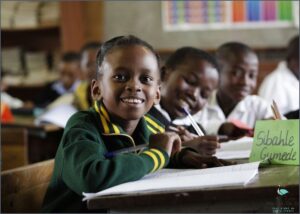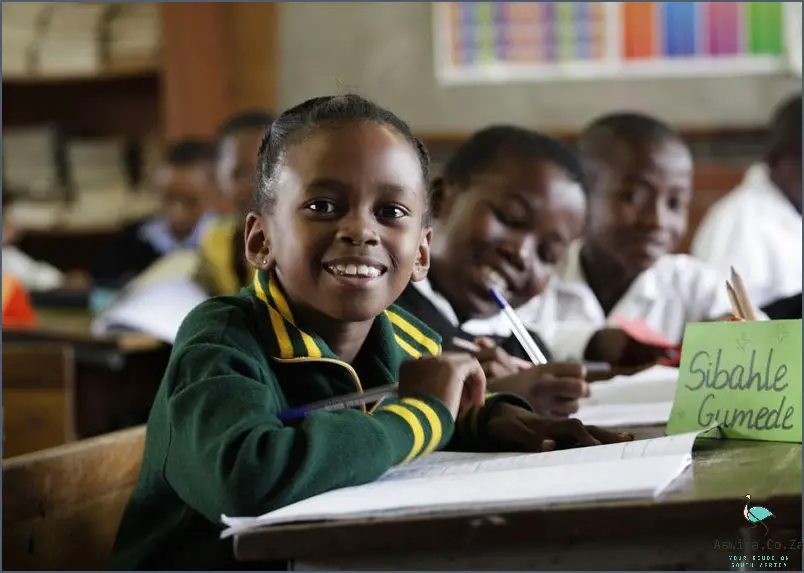
South African education is one of the most diverse systems in the world. The country has a long history of struggle and change. It has seen the rise and fall of many regimes, and the education system has been a reflection of this.
The early years of education in South Africa were shaped by apartheid. The government system of segregation meant that black and white children went to separate schools. This led to a lack of integration and education inequality.
Since the end of apartheid, South African education has undergone a lot of change. The country has moved from a system that was designed to keep black and white people separate, to one that is designed to promote equality. This has been a difficult process, and there is still a lot of work to be done.
There are a number of different types of schools in South Africa. There are traditional schools, which are often called "colonies", and these are mainly found in rural areas. There are also government schools, which are found in all parts of the country. They are generally better quality than traditional schools, and they offer a range of different programmes.
There are also private schools in South Africa. These are mainly found in the major cities, and they are usually much
Contents
South African Education
South African education is a complex and often challenging landscape, with stark inequality between the resources available to the rich and the poor. Despite the country’s strong constitutional commitment to the right to education, it is facing a range of issues including teacher shortages, overcrowded classrooms, and inadequate learning materials. As a result, the quality of education in South Africa is far lower than in many other parts of the world, leading to a wide gap between the skills and knowledge of the country’s population and those of the developed world. The government is working to address these issues, but much more needs to be done to improve the quality of education in South Africa.
History of Education in South Africa
The history of education in South Africa is a complex and turbulent one. From the earliest days of colonization to its eventual independence, South Africa has faced numerous obstacles to providing quality education to its citizens. The legacy of colonialism and apartheid has left a lasting mark on the education system, with the majority of schools still bearing the legacy of the past.
The education system in South Africa prior to colonization was based on the traditional apprenticeship system, with children learning practical skills from their parents and elders. This system was disrupted with the arrival of Dutch and British settlers in the 1600s, who brought with them their own educational philosophies and practices. The first school in South Africa was established in 1658, and was used to educate children of settlers.
The education system during the apartheid era was heavily segregated, with black children attending separate schools from white children. These schools were mostly inferior to those attended by white children, and were largely funded by the government. This created a significant disparity in the quality of education received by white and black students, with black students often receiving inadequate resources and instruction.
In the post-apartheid era, the government of South Africa has made significant efforts to improve the quality of education in the country. The national education system is now free and accessible to all, and the government has made significant investments in infrastructure, teacher training, and curriculum development. The country has seen a dramatic increase in the number of students attending secondary and tertiary educational institutions, and the number of universities and colleges has grown exponentially in recent years.
Despite these improvements, there is still much work to be done in order to ensure that all South African students receive a quality education. The legacy of colonialism and apartheid still affects the education system, and the disparities in resources and access to quality education remain. In order to ensure that all South African students have access to the best possible education, the government must continue to invest in the education system, and provide resources and support for students and teachers alike.
Current Education System in South Africa

The current state of education in South Africa is a complex and ever-evolving landscape. With its history of apartheid, inequality, and poverty, South Africa faces a myriad of challenges when it comes to providing quality education to its population. Despite numerous initiatives to improve the situation, educational attainment in the country remains low, with more than half of South African children not completing their secondary schooling.
The South African government has made significant efforts to improve access to education and to promote educational attainment. The government has implemented a number of initiatives to address the needs of those living in poverty, including the provision of free primary education and the promotion of higher education opportunities. The Department of Education has also launched a number of programs to promote literacy and numeracy, improve teacher training, and strengthen school infrastructure.
Despite these efforts, the South African educational system remains deeply flawed. The legacy of apartheid continues to shape the educational landscape, with schools in majority black areas suffering from a lack of resources, unqualified teachers, and overcrowded classrooms. In addition, the system is highly segregated, with white students attending better-resourced schools than their black counterparts.
In addition to these structural challenges, there are also a number of issues related to the quality of education. Inadequate teacher training, poor curriculum design, and a lack of educational materials are all contributing to South Africa’s low educational attainment rate.
The South African government has made some advances in bridging the educational divide, but there is still a lot of work to be done. The government must continue to invest in education, provide more resources to schools in impoverished areas, and ensure that all teachers are adequately trained. Only then can South Africa hope to improve its educational system and give its children the opportunity to reach their full potential.
Challenges Facing South African Education
The education system in South Africa is facing a number of challenges. These challenges range from systemic issues such as a lack of resources and support, to social issues such as poverty and inequality. In order to improve the quality and accessibility of education in South Africa, these challenges must be addressed.
One of the primary challenges facing South African education is a lack of resources. There is a significant disparity in the quality of education between the rich and the poor, with the latter often having to make do with inadequate facilities and limited access to educational opportunities. This has resulted in a large number of students who are unable to access quality education and are forced to drop out of school.
In addition to this, South Africa suffers from a lack of qualified teachers. Many teachers are underpaid and undertrained, leading to a lack of enthusiasm and commitment to their profession. This has a direct impact on the quality of education provided to students, who often have to make do with inadequate teaching.
The issue of inequality is another challenge facing South African education. Despite efforts to reduce disparities in education, the gap between rich and poor remains. This inequality is reflected in the number of students who are unable to access quality education, as well as in the number of students who drop out of school due to poverty or other reasons.
Finally, South Africa’s education system is hampered by a lack of support from the government. With limited resources and funding, it is difficult for the government to provide the necessary support to schools and teachers. This has led to a lack of initiatives to improve the quality of education, as well as a lack of investment in educational infrastructure and resources.
Though South African education is facing numerous challenges, there are a number of initiatives in place to address them. The government has implemented a number of policies to reduce inequality in education, as well as to improve the quality of education provided to students. In addition, many NGOs have been working to improve educational opportunities for those living in poverty.
However, in order for South African education to improve, more needs to be done. The government must invest more in educational infrastructure and resources, and ensure that teachers are well-trained and paid a fair wage. In addition, more needs to be done to reduce inequality in education, and to ensure that those from disadvantaged backgrounds have access to quality education.
Conclusion
In conclusion, South African education has seen a significant amount of progress over the past few decades. Despite this progress, there is still much work to be done in order to ensure that all South African students have access to a quality education. The South African government has taken steps to improve the state of education in the country, such as implementing a number of national initiatives and investing heavily in infrastructure and resources. However, there is still a need for increased investment in teacher training and support, as well as targeted interventions to ensure that all students, regardless of socio-economic background, have access to quality education. With the right support and resources, South African education can continue to move forward and provide quality educational opportunities for all.




